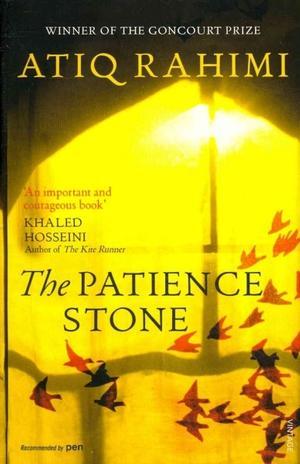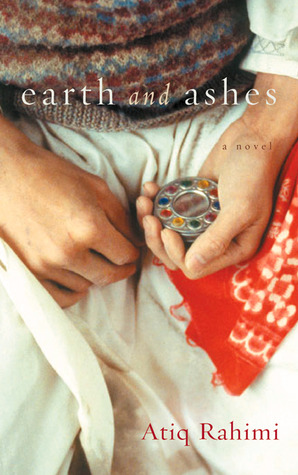There’s an old Persian myth about a black stone that, when confessed to, absorbs and absolves, until the day comes when it can take no more and explodes. This is The Patience Stone (2008, tr. Polly McLean, 2010), Atiq Rahimi’s first novel in French (his prior work was written in Dari), and winner of the 2008 Prix Goncourt.
The novel isn’t just based on a myth, it feels mythic. There’s no definitive time, no pin-point location; there’s the sense that the never-ending cycle of war (for war’s sake) has left little landscape to ravage. The days pass, the silence punctuated with gunfire and calls to prayer. In one house, in a “stifling” room, an injured man lies in a coma, his wife tending his basic needs and praying. The sunlight finds her through holes in the curtains, as if to introduce the real focus, for this is a novel that doesn’t so much look out at the effect of conflict, but is a window into the obscured world of women within Afghan society.
The society is heavily patriarchal, where women are little more than property. A subjugated commodity ripe for trading, as per deep-rooted tribal customs; a demographic with no voice that consciously lives in fear of rape and murder. Never dishonoured, but capable of dishonouring men, usually by other mens’ actions rather than their own. As the woman — unnamed, an Afghan everywoman — says to her husband:
‘You don’t suffer! You’ve never suffered, never! I’ve never heard of a man surviving a bullet in the neck! You’re not even bleeding, there’s no pus, no pain, no suffering! “It’s a miracle!” your mother used to say…Some bloody miracle!” She stands up. ‘Even injured, you’ve been spared suffering.’
Much of The Patience Stone is just the woman talking to her husband, though it’s understandable as, with his inertness and questionable consciousness, this may well be the only occasion she has to speak her mind. Here is where Rahimi builds the tension, allowing the woman to start small but eventually, as she finds her tongue, she is able to pour out her rage — at men, at war, at Allah — and in doing so finds some catharsis.
And then I realised that since you’ve been ill, since I’ve been talking to you, getting angry with you, insulting you, telling you everything that I’ve kept hidden in my heart, and you not being able to reply, or do anything at all…all of this has been soothing and comforting to me.’
As the myth goes, one confesses to the black stone, and it’s an easily drawn parallel that the husband represents the stone – taking her words without comment – as the woman confesses, and eventually finds the courage to voice her greatest kept secret. But it works both ways, as women in this society have absorbed the excesses of man and their perennial power struggles for too long, similarly without reply. That Rahimi sets the book “somewhere in Afghanistan or elsewhere” suggests the customs are endemic and that it’s not so much his homeland in his sights but the wider culture it represents.
There’s much to chew on here, despite the story’s seeming simplicity. Small events hint at wider symbolism and the longer moments of dialogue are regularly broken by more minimalist, poetic moments as Rahimi distills the atmosphere to a few declarative lines that carry the weight of suggestion.
Dawn.
The Mullah performs his call to prayer.
The weapons are asleep. But the smoke and smell of gunpowder maintain their presence.
Light with touch and heavy with pain and sorrow, it’s a thoroughly gripping novel peering behind the curtain and reporting back on an Afghanistan that, like the husband’s condition, seems unlikely to change. Never didactic, Rahimi captures the woman’s history of anguish giving her the chance to be heard, to be sexual, and to be valued. And maybe one day, like the titular stone, the situation experienced will shatter with the extent of the suffering it has heard.

